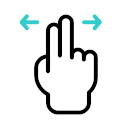LASIK versus reading glasses.
By early 40s to mid-40s, all adults lose some ability to focus on nearby objects (the phenomena is called presbyopia), which results in difficulty reading small print or doing close-up tasks.
One possible benefit of having been shortsighted most of your life is that this condition actually compensates partially for the presbyopia that inevitability develops as you get older. A shortsighted eye will focus near objects by itself without reading glasses. LASIK surgery removes this near focus because the shortsightedness has been corrected. This means that as you get older you will need to use reading glasses. Many people are happy to benefit from clear distance vision when they are younger for having to wear reading glasses for when they become older. Please note that often as part of LASIK surgery, your ophthalmologist may leave a slight degree of post-operative shortsightedness (myopia ) so that you can enjoy independence from reading glasses for a longer period of time.
If you are an adult already in your late 30s or 40s considering refractive surgery, you might choose to have your vision corrected for monovision, to maintain your ability to see objects close up. With monovision, one eye is corrected for distant vision, and the other eye is corrected for near vision. Not everyone is able to adjust to or tolerate monovision. It’s best to do a trial with contact lenses before having a permanent surgical procedure.

